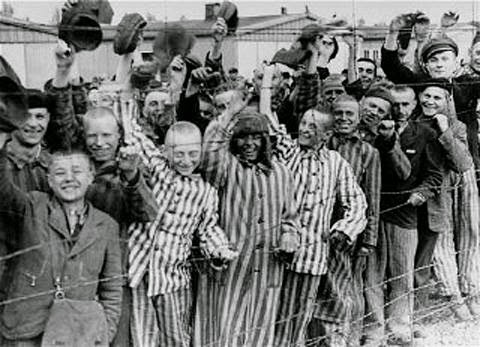29. April 2015
Henry (Heinz) Landman and the 70th Anniversary of the Liberation of Dachau
(Eine deutsche Übersetzung findet sich im nächsten Blogeintrag.)
Veronika Stumpf wrote the biography of Henry Landman for the book of remembrance some years ago. Many thanks to Rick Landman who wrote the following text about his fathers remembrance on the liberation of Dachau.
My father was so excited to be invited to the 70th Anniversary of the liberation of Dachau; for he was not only there at the liberation as an American soldier, but was also interned there as a Jew after Kristallnacht. Sadly, he died shortly after receiving the invitation. Over the years, he told me so many stories about Dachau, but I think this one is the most relevant for the 70th Anniversary of the Liberation. This is in remembrance of one of the stories my father told me.In 1945, the town of Dachau had one major road with a few side streets off to the sides. When he arrived the street was full of people shouting, eating, looting, and running around either in exuberance of their new freedom or fear of what will happen next. Colonel Porter gave him a jeep, and while riding down the street, a woman in a long black dress jumped into the middle of the street waving her hands trying to get my father’s attention. His jeep stopped and my father hopped out in his U.S. Army uniform, carrying his rifle and went up to her asked her what she wanted. Her face showed a combination of urgency and fear, but she calmed down and motioned him to go with her into a small house with a bakery on the ground floor. She wanted to get off the street before she would tell him why she was so frantic. When inside, she explained that someone was hiding downstairs who wanted to surrender directly to an American soldier. She said that she just wanted him out of her house and didn’t know what to do.
The man who ran into her store was still wearing his S.S. uniform and was more afraid of the newly liberated concentration camp prisoners than he was of the U.S. Army. My father went down a spiral staircase pointing his rifle as he slowly descended, and there hovering in the corner, was probably a former Captain in charge of the S.S. officers at Dachau Concentration Camp. When the Nazi officer saw my father, he stood up and saluted him with an American salute and he said that he wanted to surrender to an American, and be away from the mob of former inmates. The whole thing was so bizarre to my father who could still remember being in Dachau as an inmate. Even if this man was not the same Captain as in 1938, the thought of my father being the savior of an S.S. officer was quite ironic. In retrospect, my father wondered if the Captain was actually the son of the screaming woman, and she tricked him into saving her son.
My father didn’t explain who he was and why he spoke German and just let them wonder if all of the U.S. soldiers were as conversant as he. The Captain walked upstairs with his hands over his head, and then my father and the other soldier who was watching the jeep put the Captain on the hood of the jeep and told him to hold on to the metal bar that was attached to the front bumper. This bar was the latest invention of the Americans to try to keep them from being decapitated. The Germans would tie a thin wire around a tree on one side of the street and then cross the street and tie it to another tree, hoping that the American soldiers in the convertible jeeps would ride by and have their heads sliced off.
My father didn’t have to worry this day about any decapitation. In addition to the outreaching metal stick, he had a Nazi officer in the front who would feel any wire before they would. As my father drove down the main street of Dachau with this prominent Nazi on the hood, he remembered that six years earlier he was released from Dachau and was told that he better get out of Germany, because the next time he ended up in that camp, he wouldn’t be getting out alive. Now six years later, he was an American soldier saving the life of a man in charge of all that killing.


